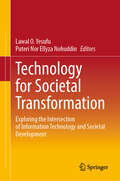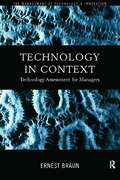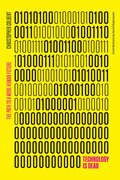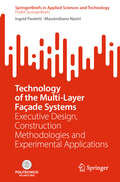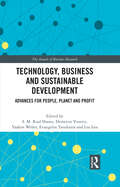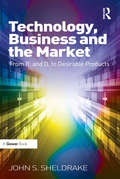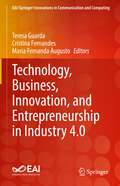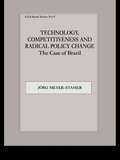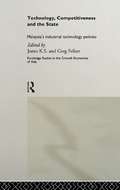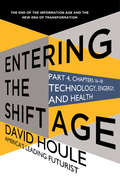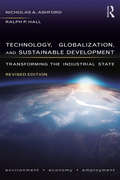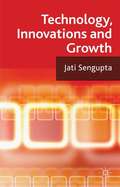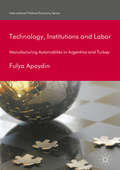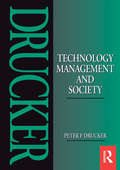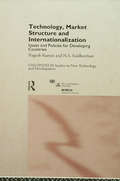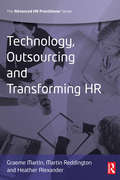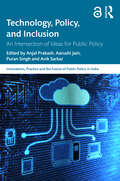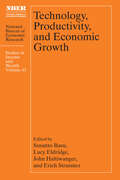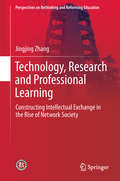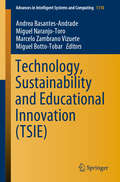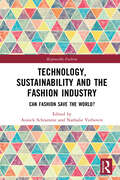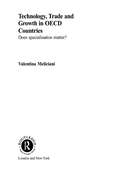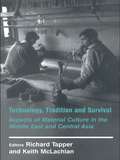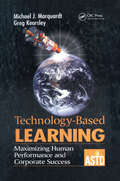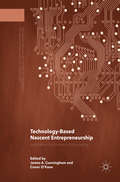- Table View
- List View
Technology for Societal Transformation: Exploring the Intersection of Information Technology and Societal Development
by Lawal O. Yesufu Puteri Nor Ellyza NohuddinThis book extensively investigates the dynamic relationship between information technology and societal transformation. The book explores a range of applied IT uses, ranging from educational technology to the complex applications of cybersecurity, the promise of blockchain technologies, e-commerce and rural development, and social media and its applications in political activism. Investigating key topics in social development and the role information technology plays in elevating our lives, the book navigates this ever-changing landscape of technological innovation to determine how it can be a source for good and improve our lives by driving positive social change. While focusing on the practical application of technology to real-world situations, examples, and cases, the book primarily focuses on educational development, entrepreneurship, sociopolitical transformation, and the security and defence of society. Collectively, these explorations serve to better highlight how technology can be harnessed in the creation of a more inclusive and equitable society. Hence, the book will be a useful read for students, academics, policymakers, business and social investors.
Technology in Context: Technology Assessment for Managers (The\management Of Technology And Innovation Ser.)
by Ernest BraunMost managers know very little about the technology they introduce into their firms, often preferring to leave such decisions to a small band of technological 'experts'. As a result large amounts of time and money are often wasted on inappropriate and inefficient systems. The cost of retraining and reorganising can also be prohibitive if the new technology does not deliver the desired results. In a business environment where technology is of increasing importance, the non-technical manager cannot afford to remain in the dark. Technology in Context provides a toolkit of approaches to this difficult subject. Subjects covered include: * the fundamental concepts required for the management of technology * the gathering of information in a firm to support strategic decisions on technology * technology assessment in the public domain * the wider social implications of technology * problems associated with technology, from the danger of environmental degradation to employment and skills.
Technology is Dead: The Path to a More Human Future
by Chris ColbertHow did we end up here, masters of scientific insight, purveyors of ever more powerful technologies, astride the burning planet that created us, and now responsible for cleaning up the mess and determining the future direction of all of life? And what do we do about it?Technology is Dead is a book that attempts to answer both of those questions. It is a book of both challenge and hope, written for those who are able or willing to lead us out of our global predicament. It is a book for everybody: the politicians, CEOs, community leaders, everyday parents, and young people who understand that we must change our ways to ensure a sustainable future for all living things and the planet we rely on.
Technology of the Multi-Layer Façade Systems: Executive Design, Construction Methodologies and Experimental Applications (SpringerBriefs in Applied Sciences and Technology)
by Ingrid Paoletti Massimiliano NastriThe book explores the design, production and construction processes of the multi-layer façade systems towards the principles of environmental and energy sustainability through the drafting of an explanatory and operative reference instrument. The work provides the planning of a technical guide, focusing on the executive design and construction methodologies. The scientific basis of the research implies the definition of the main functional typologies, established on the analysis conducted on the experimental case studies, with the aim of achieving a codification of the performance and executive potentialities. The development of the book as a technical guide on the multi-layer façade systems involves the possibilities of technology transfer towards different building types and intended uses, with the aim of increasing hygro-thermal, lighting and acoustic performance through the application of technical skins, devices and integrated screens on the external enclosures. Moreover, the book explains the modes of technology transfer through the use of standard and non-customized products, so as to improve the diffusion in the production and construction of mass-produced systems and components.
Technology, Business and Sustainable Development: Advances for People, Planet and Profit (The Annals of Business Research)
by Demetris Vrontis Yaakov Weber Evangelos Tsoukatos Lea Iaia Shams, S. M. RiadTriple bottom line (TBL or 3BL) was coined as a wide and inspiring approach for businesses aimed at understanding how to create, track, and manage economic, social, and environmental values added. The sustainability sector is strongly increasing its relevance among academics and practitioners, and the market opportunities associated with the sustainable development goals (SDGs) are estimated at over $ 12 trillion per year by 2030. Although this is a promising context, a recent article suggested a rethinking of the TBL, arguing that sustainability goals’ value should not be assessed in terms of profit and loss but of people well-being and planet health, looking for a societal profit. Technology plays a crucial role in our society. Respectively, the Agenda 21 and the Paris Agreement consider technology to be essential in the pursuit of sustainable development and the achievement of the SDGs. Adding to this, the Covid-19 pandemic has accelerated the adoption of digital solutions in several fields, from the way of working to the way of buying and consuming. Companies are becoming more aware of the responsibility they have within environmental and human contexts, and people are looking for work reflecting their values and purposes to motivate them. This book aims to contribute to the understanding of the role of technology and its emerging and innovative solutions in the achievement of sustainable development while making a profit. It will be of value to researchers, academics, practitioners, and students in the fields of strategic management, entrepreneurship, management of technology and innovation, and sustainable development.
Technology, Business and the Market: From R&D to Desirable Products
by John S. SheldrakeJohn Sheldrake’s long experience of teaching business and management to engineers has highlighted a gap in the knowledge of students and practitioners alike, between their grasp of developments in science and technology and how these developments lead to the creation of successful products. Using case studies, Technology, Business and the Market explores the impact of new materials, techniques and technologies, and looks at the links between innovation, entrepreneurship, business (including finance), design, manufacturing, branding and marketing. The author examines the ways in which scientific endeavour is conditioned and even distorted by contextual issues such as finance and fashion. This demonstration of the synthesis of technology, business and the market has relevance for students, practitioners and policy makers in established and emerging markets.
Technology, Business, Innovation, and Entrepreneurship in Industry 4.0 (EAI/Springer Innovations in Communication and Computing)
by Teresa Guarda Maria Fernanda Augusto Cristina FernandesThis book presents the most recent innovations, trends, and challenges in several aspects of Industry 4.0, including the key technologies and business impacts. The book is relevant to a variety of stakeholders due to Industry 4.0’s broad impact in many fields. Topics include digital workplace solutions for employee engagement, entrepreneurship and innovation, and Blockchain for business security. The authors cover Industry 4.0 both from a theoretical and applicable standpoint.
Technology, Competitiveness and Radical Policy Change: The Case of Brazil
by Jörg Meyer-StamerThis volume investigates the limited effectiveness of technology policy in the inward-oriented industrialization model of the past. It looks at the political structures that compromise the transition to the development model, and the restructuring effort within Brazilian industrial firms.
Technology, Competitiveness and the State: Malaysia's Industrial Technology Policies (Routledge Studies In The Growth Economies Of Asia Ser. #Vol. 23)
by K. S. Jomo Greg FelkerThis volume, and its companion, Industrial Technology Development in Malaysia, examine and evaluate Malaysian industrialization in terms of its experience of and prospects for industrial technology development. The focus is on role played by state-sponsored innovation in the process economic development and in the context of national development st
Technology, Energy, and Health (Entering the Shift Age, eBook #6)
by David HouleWe are leaving the Information Age and transitioning into the Shift Age, a time of transformation and change that offers both great risk and incredible opportunity. In Entering the Shift Age, David Houle identifies and explains the dynamics and forces that have shaped our world and will continue to reshape our world for the next 20 years. He shows how the Shift Age means a world fully global yet focused on the individual, where the speed of change is so fast that change itself is the new norm. He also comments from the front lines of the Shift Age on issues and topics that affect our lives, from business and technology to environment, media and global culture. eBook 6 looks at three of the most significant areas of change in the Shift Age, offering a high-level tour of the major changes and trends in technology, energy, medicine, and health management.
Technology, Globalization, and Sustainable Development: Transforming The Industrial State
by Nicholas A Ashford Ralph P HallTechnology, Globalization, and Sustainable Development offers a unified, transdisciplinary approach for transforming the industrial state in order to promote sustainable development. The authors present a deep analysis of the ways that industrial states – both developed and developing – are currently unsustainable and how economic and social welfare are related to the environment, to public health and safety, and to earning capacity and meaningful and rewarding employment. The authors offer multipurpose solutions to the sustainability challenge that integrate industrial development, employment, technology, environment, national and international law, trade, finance, and public and worker health and safety. The authors present a compelling wake-up call that warns of the collision course set between the current paths of continued growth and inevitable unsustainability in the world today. Offering clear examples and real solutions, this textbook illustrates how the driving forces that are currently promoting unsustainability can be refocused and redesigned to reverse course and improve the state of the world. This book is essential reading for those teaching and studying sustainable development and the critical roles of the economy, employment, and the environment.
Technology, Innovations and Growth
by Jati K. SenguptaThis book provides detailed empirical analysis of countries in Asia to examine various dynamic models that incorporate the impact of technology and innovations on the industry evolution and overall economic growth.
Technology, Institutions and Labor: Manufacturing Automobiles In Argentina And Turkey (International Political Economy Ser)
by Fulya ApaydinIn this book Fulya Apaydin argues that labor responses to dramatic technological change are influenced by the political institutions of the Global South more than any other factor. In addressing vocational education programs – which are highly relevant in understanding how labor unrest is governed in developing settings – she makes two important contributions. Firstly, she offers a new theoretical framework to understand labor mobilization and de-mobilization patterns, rethinking vocational education as a key transmission belt for manufacturing labor consent. Secondly, she provides a systematic comparison of skill formation schemes and their implications on labor mobilization in federal and unitary systems. With a focus on Argentina and Turkey, two case studies are provided in which technology has provoked differing levels of strikes, walkouts and extended protest.
Technology, Management and Society
by Peter DruckerIn this volume Drucker has collected twelve essays on technology and management and their relationship to, and interaction with, human society. In these essays the reader is able to grasp and savour some of the essential ideas and philosophy that have been expanded into Drucker's various books. In this volume Drucker has collected twelve essays on technology and management and their relationship to, and interaction with, human society. In these essays the reader is able to grasp and savour some of the essential ideas and philosophy that have been expanded into Drucker's various books.
Technology, Market Structure and Internationalization: Issues and Policies for Developing Countries (UNU/INTECH Studies in New Technology and Development #Vol. 5)
by Nagesh Kumar N. S. SiddharthanTechnology, Market Structure and Internationalization discusses the domestic and external factors that impinge upon the process of technological capability building in developing countries and draws policy implications. Specifically, it examines the interaction between technological effort in developing countries. Providing fresh insights, this volume will be of interest to researchers in development economics as well as to those involved with the creation of policy in developing countries.
Technology, Outsourcing & Transforming HR
by Graeme MartinThis book examines the progress made in e-enabling the HR function and the relationship with outsourcing. The editors will review and analyse recent developments in the application of outsourcing and ICT to the HR function and its overall contribution to organizational aims. This text aims to fill the gap in current literature, by providing accessible guidance on how to tackle the e-enablement of the function and on the factors associated with successful outsourcing. There is no single text that adequately deals with this increasingly important problem and which has been recognised by the CIPD as a key area of research for their forward programme. The contributors all have leading-edge knowledge and practical experience and aim to provide practical guidance for organizations and HR professionals.
Technology, Policy, and Inclusion: An Intersection of Ideas for Public Policy (Innovations, Practice and the Future of Public Policy in India)
by Anjal Prakash, Aarushi Jain, Puran Singh, and Avik SarkarTechnology, Policy, and Inclusion looks at the intersections between public policy and technology in India. It explores the barriers in instituting effective governance and development and examines how these can be mitigated through technological interventions in developing countries. Increased digitisation of the economy has added to the development challenges in India and issues such as exclusion and social inequality. This volume stresses the need for governments to leverage technology to bring more vulnerable and marginalised groups into the fold of financial and social inclusion. It also focuses on the importance of regulation for a responsible integration of technologies and minimising risks. The book includes examples and case studies from different areas including management of the COVID-19 pandemic through digital means, real estate digital infrastructure, digital census, e-markets for farmers, and government interventions that use technology to deliver financial services in remote areas of the country. It also outlines various solutions for fostering equity and socio-economic development. Part of the Innovations, Practice and the Future of Public Policy in India series, this volume will be of interest to students and researchers of public policy, political science, development studies, and sociology as well as policy professionals and technocrats. This book is freely available as a downloadable Open Access PDF at http://www.taylorfrancis.com under a Creative Commons (CC-BY-NC-ND) 4.0 license.
Technology, Productivity, and Economic Growth (National Bureau of Economic Research Studies in Income and Wealth)
by Susanto Basu, Lucy Eldridge, John Haltiwanger, and Erich StrassnerA wide-reaching exploration of how technological advancements influence and shape productivity and economic growth. Current technological developments in several industries, such as the rise of artificial intelligence and innovations associated with the green energy transition, are likely to have significant and wide-ranging effects. This volume explores the implications of rapid changes in advanced technology and considers how to conceptualize and model these advances and improve measures of productivity and economic growth. The study of these issues is facilitated both by new methods for using and integrating disparate data sources and by the availability of new data sources. The chapters in this volume leverage these developments to offer fresh insights into long-standing issues in productivity analysis and technological change.
Technology, Research and Professional Learning: Constructing Intellectual Exchange in the Rise of Network Society (Perspectives on Rethinking and Reforming Education)
by Jingjing ZhangThis book investigates the use of network technologies in research, and explores how such use potentially changes the nature of professional learning between academics. It attempts to situate the discussion of technology use in real-world research settings, to identify the different forms of participation in intellectual exchange embedded in academic dialogue, and to further contribute to knowledge on how the use of network technology potentially changes the nature of learning. Multiple data collection methods are employed, in two forms of study: a single case study, and a number of individual interviews. The single case study was carried out over a one-year period, and consisted of interviews (22 interviewees), observations, and document review. Individual semi-structured interviews were carried out over a similar period of time with a wider and different population of 24 academics from different Oxford faculties. Half of these were interviewed twice.The main findings presented in this book demonstrate that the direct consequences of technology use are changes to academic dialogue and scholarly communication in general. The change to this critical aspect of research – scholarly communication – has potentially led to more distributed research in interconnected research environments. It is the changes to scholarly communication and the research environment that consequently affect participation in intellectual exchange.
Technology, Sustainability and Educational Innovation (Advances in Intelligent Systems and Computing #1110)
by Miguel Botto-Tobar Andrea Basantes-Andrade Miguel Naranjo-Toro Marcelo Zambrano VizueteThis book presents the proceedings of International Conference on Knowledge Society: Technology, Sustainability and Educational Innovation (TSIE 2019). The conference, which was held at UTN in Ibarra, Ecuador, on 3–5 July 2019, allowed participants and speakers to share their research and findings on emerging and innovative global issues. The conference was organized in collaboration with a number of research groups: Group for the Scientific Research Network (e-CIER); Research Group in Educational Innovation and Technology, University of Salamanca, Spain(GITE-USAL); International Research Group for Heritage and Sustainability (GIIPS), and the Social Science Research Group (GICS). In addition, it had the endorsement of the RedCLARA, e-science, Fidal Foundation, Red CEDIA, IEEE, Microsoft, Business IT, Adobe, and Argo Systems. The term “knowledge society” can be understood as the management, understanding and co-creation of knowledge oriented toward the sustainable development and positive transformation of society. In this context and on the occasion of the XXXIII anniversary of the Universidad Técnica del Norte (UTN), the Postgraduate Institute through its Master of Technology and Educational Innovation held the I International Congress on Knowledge Society: Technology, Sustainability and Educational Innovation – TSIE 2019, which brought together educators, researchers, academics, students, managers, and professionals, from both the public and private sectors to share knowledge and technological developments. The book covers the following topics: 1. curriculum, technology and educational innovation; 2. media and education; 3. applied computing; 4. educational robotics. 5. technology, culture, heritage, and tourism development perspectives; and 6. biodiversity and sustainability.
Technology, Sustainability and the Fashion Industry: Can Fashion Save the World? (Responsible Fashion)
by Annick Schramme Nathalie VerbovenThere is widespread rhetorical agreement that the fashion industry must get itself onto a more sustainable footing. What does this mean in practice, and how can sustainability be achieved in different regions around the world? This book brings together expert scholars and reflective practitioners via a network of dialogue and exchange to help drive forward a sustainable future for the fashion industry. With a focus on technological innovation, the contributions to this book provide a range of case studies from design thinking, through digital clothing and inclusive fashion. This book will be of interest to researchers and scholars in the fields of circular business and the fashion industry, and provides a unique resource for readers seeking to understand more about the need for responsible fashion and how technology might be able to help.
Technology, Trade and Growth in OECD Countries: Does Specialisation Matter? (Routledge Studies In The Modern World Economy Ser.)
by Valentina MelicianiPresenting new material and a fresh perspective, Technology, Trade and Growth in OECD Countries, provides a unifying framework for the exploration of the role played by specialisation in economic growth and international competitiveness.
Technology, Tradition and Survival: Aspects of Material Culture in the Middle East and Central Asia (History and Society in the Islamic World)
by Richard Tapper Keith McLachlanThe contributors address the history, originality, variety and sophistication of traditional science, technology and material culture in the Middle East and Central Asia, their influence on the history of Europe and the West, and the threat posed by modern Western technologies.
Technology-Based Learning: Maximizing Human Performance and Corporate Success
by Michael J. Marquardt Greg KearsleyCompanies worldwide are recognizing the critical importance of harnessing the learning capabilities of people and technology in the workplace. Technology-Based Learning:Maximizing Human Performance and Corporate Success shows how to capture and leverage this power, through techniques of knowledge management.This comprehensive overview examines the advantages and disadvantages of learning technologies, and provides a guide for selecting, costing, and applying the various techniques.Technology in the workplace has many overwhelming possibilities-so many that they've left many managers and HRD professionals confused and perplexed. Let Marquardt and Kearsley show you how to bring technology under control to meet the needs of your company and your employees.
Technology-Based Nascent Entrepreneurship
by James A. Cunningham Conor O’kaneThis edited volume presents new means of quantifying the behavioral and consequential differences between technology-based and non-technology-based nascent entrepreneurs in varied economies. It explores the socioeconomic place of technology in developed and developing countries, and describes the implications of this research for policymakers' ability to identify and support new areas of economic growth. This book also examines technology-based nascent entrepreneurship issues in the context of entrepreneurial leadership, business incubation, ethnic migrants, university researchers, new venture formation activities, student entrepreneurship, and start-up competitions. The contributors to this collection provide valuable insights for the growing study of and expanding policies addressing nascent entrepreneurship.
